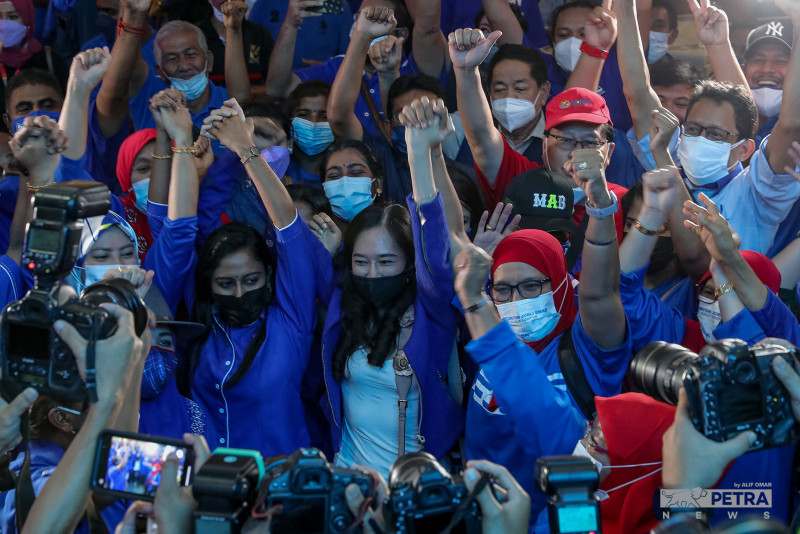Taking stock of a BN win – Terence Fernandez
When good governance and reforms take a backseat to political stability

Barisan Nasional’s thumping victory in Johor yesterday, which gave it a supermajority of 40 out of 56 seats, cannot be merely dismissed to low voter turnout. – ALIF OMAR/The Vibes pic, March 13, 2022

Terence Fernandez
WITH another state election done and dusted, those left licking their wounds need to come to terms with the message the electorate is sending.
Barisan Nasional’s (BN) thumping victory in Johor yesterday, which gave it a supermajority of 40 out of 56 seats, cannot be merely dismissed to low voter turnout.
A turnout of 54.92% is significant considering the electoral role has increased to 2.597 million voters including 749,000 newly registered ones.
Comparatively, in 2018 there were 1.8 million registered voters.
That Muda, the youth party, could only muster one win out of seven seats is a reality check that youth will not merely vote for the young.
In contrast, Pejuang, led by 96-year old Tun Dr Mahathir Mohamad, lost all 42 seats it contested, and this could also be a writing on the wall that the electorate is as fatigued as the twice-appointed prime minister.
Similar sentiments may be accorded to Tan Sri Muhyiddin Yassin’s Perikatan Nasional which mustered three seats, where Muhyiddin’s own stronghold of Gambir fell to Umno.
It is also a reality check for Datuk Seri Shafie Apdal’s own prime ministerial ambitions as his Sabah-based Warisan’s acceptance in the peninsula was tested in Johor, where the party lost in all the six seats it contested.
More significant, however, is Pakatan Harapan (PH), which had commanded 36 state seats when it won the 2018 general election.
This time around it won only 12, with DAP taking the lion’s share of 10, and Amanah and PKR only one each.
PH, Muda, and PN were once part of the same coalition, yet collectively still command less than half of the Johor assembly with a total of 15 seats.
Some observers would call this a punishment for PH – the same blow dealt by voters in Melaka last November to the unstable coalition, which came into power four years ago full of hope and promise – only to disintegrate due to infighting, political cunning, and thievery from within and outside the coalition.
Nevertheless, a more accurate analysis of the Johor election results can only be concluded once the Election Commission (EC) digests the voting patterns and voter profile.
Also, would it be fair to use a state election results as a barometer for what is to come in the 15th general elections (GE15)?
After all, with fears of Covid-19 coupled with election fatigue, one wonders how much difference the remaining 40% of the electorate would have made if they had cast their votes.
Which brings to focus the Johor voters. What does it say about an electorate that votes for a coalition of court clusters facing corruption charges?
It is indeed telling that the majority of Johor’s voters are willing to embrace BN again – specifically Umno, whose former leader has been convicted of corruption and embezzlement of billions of the people’s money.
Datuk Seri Najib Razak received a hero’s welcome in many of the constituencies he had visited, with the “Bossku” moniker never seeming to go out of style any time soon.
That the reforms and good governance preached by PH and the rest of the present opposition do not have the same attraction they had four years ago is a worrying reflection of the electorate’s priorities.
Priorities. Not necessarily values. Good governance sometimes can take a backseat to political stability and consistency in policies.
A pragmatic electorate would want to look at factors such as the economy and pandemic recovery including job creation – a component close to the heart of youth.
Preaching against corruption and villainy of the new incumbent may just be white noise for now if there are no significant plans for youth employment and poverty eradication.
This is something the leaders of Muda, Warisan, and especially Pakatan Harapan, which won the people’s hearts and mandate in 2018, should take stock of.
More significantly, the electorate must not be made to feel that they are experimenting again in GE15 as they did in GE14.
BN may have also failed in its own disastrous trysts with PN and PAS, but its strength is drawn by the disunity of the opposition coalition that allows BN to go it alone.
With calls for a general election in June following BN’s victories in Johor, Melaka, and Sarawak before that, it will probably be just a matter of time before the people return to the polls.
Arguably BN will not have it as easy at a federal election, but PH and the rest also have their work cut out for them.
Be it a change of tact, shift of approach, or even a change in leadership, PH and its associates need to convince the people that it has the endurance to see through at least one term without putting the voters through the trauma of another Sheraton Move, which resulted in three different administrations and an equal number of state elections amid a pandemic that has killed over 33,600 people. – The Vibes, March 13, 2022
Terence Fernandez is Editor in Chief of Petra News, which publishes The Vibes and its Bahasa Malaysia sister portal Getaran
No comments:
Post a Comment